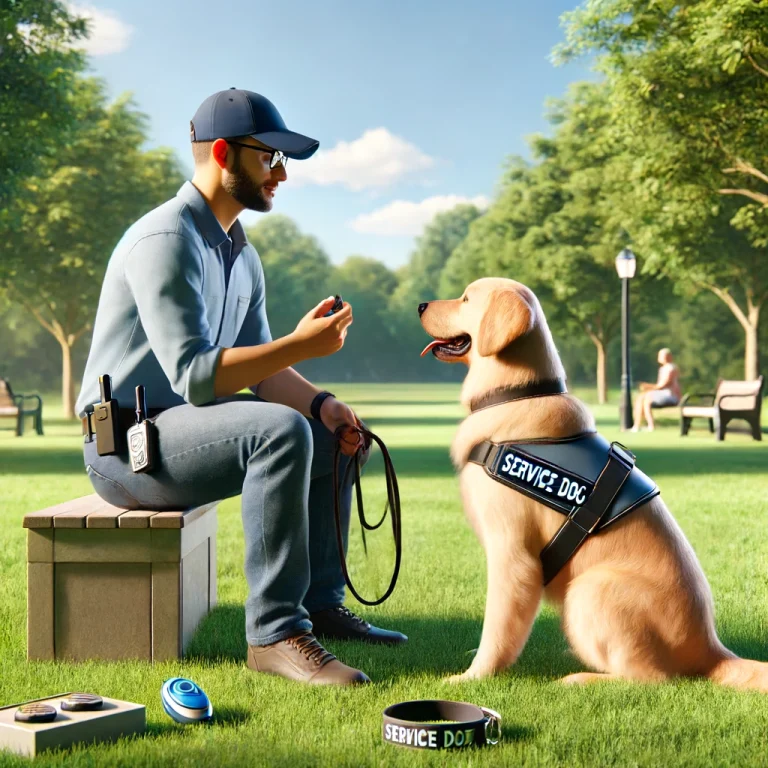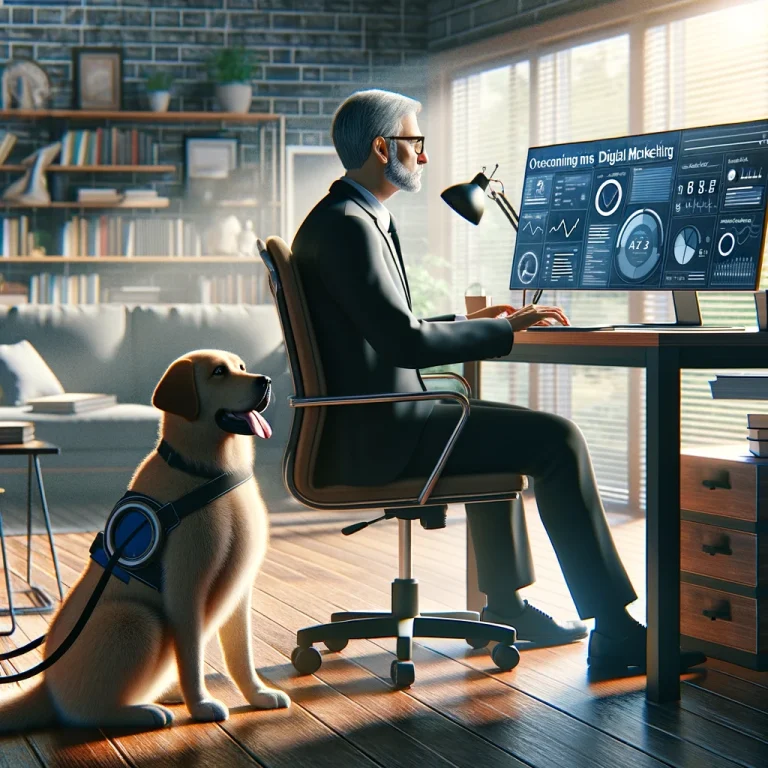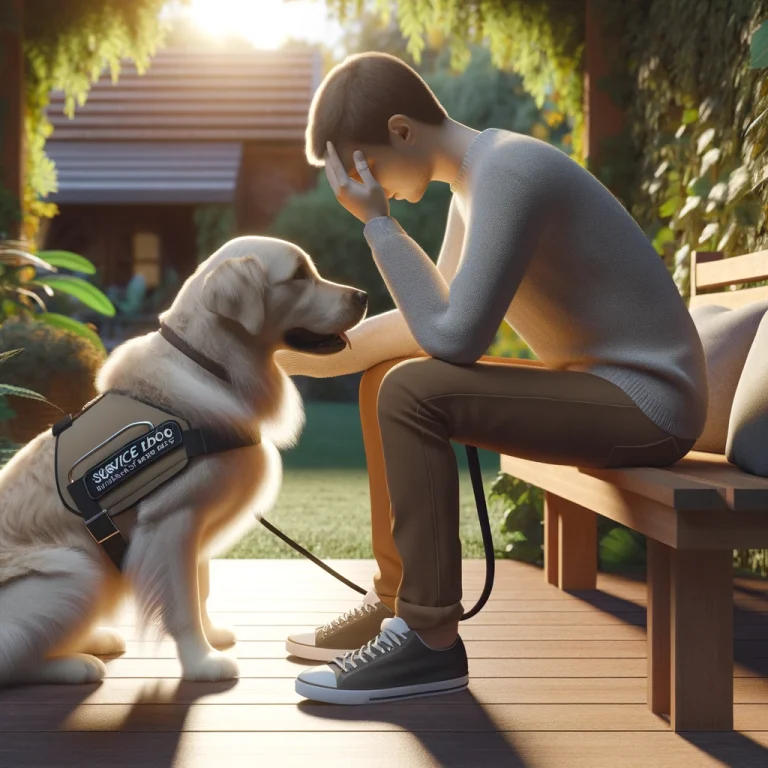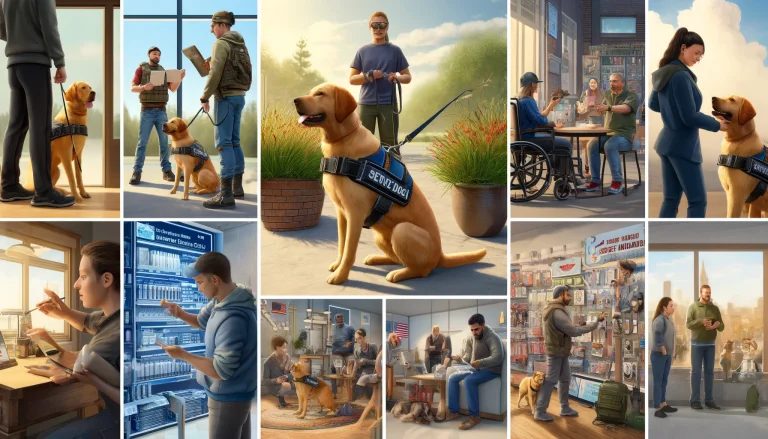Introduction: Service Dogs – Vital Allies in Enhancing Lives
Service dogs are not just pets but essential partners for people with disabilities. At ServicePupSolutions.com, we offer an expansive look at 5 types of service dogs, each uniquely contributing to improving their handlers’ lives. These dogs do much more than provide company; they are integral to their handler’s autonomy and well-being, offering specialized assistance tailored to their needs.
Guide Dogs: Providing Eyes for the Visually Impaired
Guide dogs are invaluable for individuals with visual impairments. Their comprehensive training involves not just leading their handlers but also ensuring their safety in various environments. They learn to navigate busy streets, recognize traffic signals, and avoid hazards. Training includes detailed work, like understanding specific commands and adapting to their handler’s walking speed and style. The relationship between a guide dog and its handler is based on deep trust, which is developed through consistent interaction and mutual understanding. This bond extends beyond navigation, offering emotional support and companionship.
Extensive Training Regimen and Care
Training for guide dogs encompasses obedience, socialization, and specialized skills for safe navigation. Trainers use positive reinforcement and specialized techniques to build the dogs’ skills, focusing on attentiveness and responsiveness. These dogs also require comprehensive care, including proper nutrition, regular veterinary check-ups, and mental and physical stimulation to keep them healthy and alert. Handlers play a crucial role in providing this care, ensuring their guide dogs are always prepared for the day ahead.
Hearing Dogs: The Ears for Hearing-Impaired Individuals
Hearing dogs are specially trained to assist those with hearing impairments by alerting them to specific sounds. These sounds can range from everyday noises, like a knock on the door, to critical alerts, like fire alarms. The training of hearing dogs is meticulous, ensuring they react promptly and appropriately to different sounds. This process involves not only recognizing sounds but also learning to communicate effectively with their handlers. The bond between a hearing dog and its handler is pivotal, built on trust and understanding, enhancing their handler’s awareness and interaction with their environment.
Training and Special Care Needs
Training for hearing dogs is focused on sound recognition, with emphasis on alerting their handlers in a way that is clear and distinct. These dogs require regular ear health check-ups and consistent training to keep their skills sharp. Their well-being depends on a balance of physical exercise, mental stimulation, and social interaction, ensuring they remain engaged and responsive.
Mobility Assistance Dogs: Aiding Those with Physical Challenges
Mobility assistance dogs provide essential physical support to individuals with disabilities. Their training includes a wide array of tasks, such as opening doors, pressing buttons, and assisting with mobility and balance. These tasks require strength, precision, and a deep understanding of their handler’s physical limitations and needs. The training is demanding but rewarding, resulting in dogs capable of significantly easing the daily challenges faced by individuals with physical disabilities.
Rigorous Physical Task Training and Care Requirements
The training of mobility assistance dogs involves task-specific skills that are vital for their handler’s independence. They learn through repetition, command recognition, and reward-based methods. The physical and mental well-being of these dogs is paramount. They require regular exercise to maintain their strength, ongoing training to refine their skills, and proper nutrition and veterinary care to ensure their longevity and effectiveness.
Psychiatric Service Dogs: Providing Emotional and Mental Support
Psychiatric service dogs offer crucial support to individuals with mental health conditions. They are trained to recognize and react to emotional and psychological triggers, providing comfort and a sense of security. Their presence can be calming and reassuring, helping to mitigate symptoms of anxiety, depression, and PTSD. The training for psychiatric service dogs is nuanced, focusing on emotional intelligence and the ability to respond to subtle changes in their handler’s mood and behavior.
Emotional Sensitivity Training and Holistic Care
The training of psychiatric service dogs centers on emotional sensitivity and appropriate response mechanisms. They are taught to detect emotional changes and offer support through specific behaviors and actions. These dogs thrive in stable, calm environments and require regular mental stimulation and physical care. Their emotional well-being is closely linked to their ability to perform their roles effectively.
Medical Alert Dogs: Proactive Responders in Health Emergencies
Medical alert dogs are specially trained to detect and respond to medical conditions, such as diabetes, seizures, or allergies. They have an incredible ability to sense changes in their handler’s body and take appropriate action. These dogs are trained to alert their handlers, retrieve medication, or seek help in emergencies. Their role can be life-saving, providing not just assistance but also peace of mind for their handlers and families.
Specialized Health Alert Training and Care
The training of medical alert dogs is focused on recognizing signs of medical distress and responding quickly and effectively. They undergo rigorous training to detect specific health-related changes and are taught to perform critical actions in response. Consistent health monitoring and regular training sessions are vital to maintain their skills. Like all service dogs, they require a balanced diet, regular exercise, and proper veterinary care to stay in optimal condition for their demanding roles.
Conclusion: Service Dogs – Enriching Lives in Many Dimensions
In conclusion, the 5 types of service dogs each play a unique and crucial role in improving the lives of individuals with disabilities. They offer more than physical assistance, providing emotional support and psychological stability. Their comprehensive training and specific care needs, including the importance of pet insurance, highlight the dedication required for their roles. For those considering self-training, ServiceDogOwners.com provides invaluable resources and support. These dogs’ contributions to society are immense, enhancing independence and quality of life for many. Explore the world of service dogs and their impact at ServicePupSolutions.com.
Need help self-training a Service Dog? Click Here for assistance.






